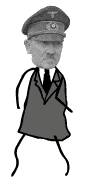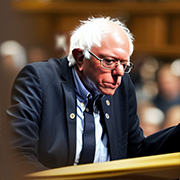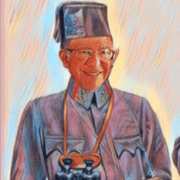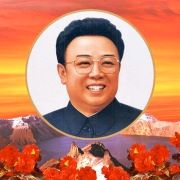|
i personally signed the molotov pact
|
|
|
|

|
| # ? May 4, 2024 12:43 |
HallelujahLee posted:i personally signed the molotov pact Thank you
|
|
|
|
|
HallelujahLee posted:i personally signed the molotov pact meanwhile, cowardly members of the reform & revolution caucus decided they were too good to meet with one of hitler's top men
|
|
|
|
but seriously, folks, if you want an example of an old bolshevik whose theoretical ideas were ahead of his time but who was too bad at politics to avoid getting killed, look no further than nikolai bukharin
|
|
|
|
tfw stalin gives you a kiss
|
|
|
|
Cassian of Imola posted:hey quick question op what was the USSR's policy on the Nazis before deciding that defeating them was the best strategy, and what made them change their minds their policy was "let's all (uk, france, SU) get together and defeat the nazis because they're dead serious" and then france and the uk told them to gently caress off and sold out czechoslovakia to nazi germany and stalin realized that's what they would do to the SU as well and consequently couldn't be relied upon
|
|
|
|
Mukulu posted:So I'm not a smart man. Can one of you nice people break down why you all don't like Trotsky(ists)? Cassian of Imola posted:hey quick question op what was the USSR's policy on the Nazis before deciding that defeating them was the best strategy, and what made them change their minds
|
|
|
|
Cassian of Imola posted:hey quick question op what was the USSR's policy on the Nazis before deciding that defeating them was the best strategy, and what made them change their minds Cassian of Imola posted:trot criticism usually focuses on real or perceived antidemocratic practices or tendencies in communist parties or governments. sincere or not, it happens to make their rhetoric line up with right-wing, capitalist criticisms of existing communist power structures. 'trots' are therefore viewed with some justification by all sides as subversive and, as in Cuba, sometimes get support and funding from capitalist foreign powers you know, thats a great point
|
|
|
|
i hate trots bc they're always telling me to read their newsletter. i ain't got time for that poo poo, leave me alone
|
|
|
|
rudecyrus posted:i hate trots bc they're always telling me to read their newsletter. i ain't got time for that poo poo, leave me alone you're missing out 50 years of CWI/ISA: Our struggle for a fighting revolutionary Marxist International - China Worker chinaworker.info - Sun, 21 Apr 2024 posted:When the CWI, the Committee for a Workers International, was formed in the upstairs of the Mother Red Cap pub (an old pub said to have been frequented by Karl Marx, rebuilt in the 1980s and ironically renamed World’s End) in London on 20-21 April 1974, exactly 50 years ago, the ambition was to sow the seeds of a new, revolutionary workers’ international that could challenge capitalism on a global scale in the foreseeable future.
|
|
|
|
mawarannahr posted:you're missing out didn’t read
|
|
|
|
the ussr was ftw because they loved hitler not in spite of it
|
|
|
|
lol every retard thinks the molotov pact is the magic bullet against stalin and not the end result of the west's constant refusal to form a front against germany with the soviets
|
|
|
|
Raskolnikov38 posted:lol every retard thinks the molotov pact is the magic bullet against stalin and not the end result of the west's constant refusal to form a front against germany with the soviets the west thought Germany had a lot of great ideas: state-funded but privately owned and private-profit corporations, shadow wing of the government sitting on boards and suppressing unions and labor, using prisoners for free labor to private corporations, corporate run prisons, and inducing capitalism to colonies, but didn’t like hitlers stodgy outdated idea of synthesis & control via boots on the ground. that last part was considered not efficient and untenable long term so we came in and took all the good ideas and kicked out the one single bad idea (because it’s not very profitable)
|
|
|
|
stalin wanted the french to get owned before he saved the world
|
|
|
|
comedyblissoption posted:stalin wanted the french to get owned before he saved the world understandable
|
|
|
|
comedyblissoption posted:stalin wanted the french to get owned before he saved the world good point. im pro-stalin now
|
|
|
|
Cassian of Imola posted:hey quick question op what was the USSR's policy on the Nazis before deciding that defeating them was the best strategy, and what made them change their minds  comedyblissoption posted:stalin wanted the french to get owned before he saved the world lol
|
|
|
|
Raskolnikov38 posted:lol every retard thinks the molotov pact is the magic bullet against stalin and not the end result of the west's constant refusal to form a front against germany with the soviets everyone knows he had reasons for carving up Eastern Europe with Hitler, and the UK and France were responsible to the extent that they limited his options. it just seems silly to pretend that Stalin's main reason for building up soviet industrial capacity was defeating nazism per se when his most famous foreign policy aims re: fascism up to WW2 were co-opting and undermining the Republican forces in the Spanish Civil War and selling out the CCP to the KMT. it seems much more likely that he was concerned about potential military rivals on the Russian border regardless of ideology all that is totally in keeping with his stated beliefs and aims re: communism in one country, which just a moment ago you nerds were defending. stalin defenders always get all huffy when you suggest he wasn't a true blue internationalist trot. you can't have it both ways!
|
|
|
|
|
|
|
|
Cassian of Imola posted:co-opting and undermining the Republican forces in the Spanish Civil War lol Cassian of Imola posted:his stated beliefs and aims re: communism in one country so true bestie, "socialism in one country" meant "socialism in one country for ever and ever, no other countries get to have it. if they try it we'll spend resources to take it away from them". thats exactly what happened postwar
|
|
|
|
I'm sorry, am I misremembering. did they win that one after the NKVD installed an unpopular, paranoid puppet at gunpoint then disappeared along with their guns and most of the Spanish treasury Cassian of Imola has issued a correction as of 23:43 on Apr 24, 2024 |
|
|
|
the cpc allied with the kmt on two separate occasions, the second time after a disastrous betrayal, and the result was that they liberated china from the foreign invaders and domestic capitalists both. this probably explains why mao praised stalin for his contributions to socialism and the cpc upholds stalin to this day
|
|
|
|
Cassian of Imola posted:I'm sorry, am I misremembering. did they win that one after the NKVD installed an unpopular, paranoid puppet at gunpoint then disappeared along with their guns and most of the Spanish treasury The USSR did more than any other country to fight the fascists in Spain and you are a dishonest anticommunist that flips from "it's bad when the USSR exports socialism" to "it's bad when the USSR doesn't export revolution" at a moments notice based on rhetorical convenience to bash them. I prefer the honest ones that just admit they think communisn is bad because they're less annoying
|
|
|
Cassian of Imola posted:everyone knows he had reasons for carving up Eastern Europe with Hitler, and the UK and France were responsible to the extent that they limited his options. it just seems silly to pretend that Stalin's main reason for building up soviet industrial capacity was defeating nazism per se when his most famous foreign policy aims re: fascism up to WW2 were co-opting and undermining the Republican forces in the Spanish Civil War and selling out the CCP to the KMT. it seems much more likely that he was concerned about potential military rivals on the Russian border regardless of ideology Lmfao
|
|
|
|
|
Ferrinus posted:the cpc allied with the kmt on two separate occasions, the second time after a disastrous betrayal, and the result was that they liberated china from the foreign invaders and domestic capitalists both. this probably explains why mao praised stalin for his contributions to socialism and the cpc upholds stalin to this day That's so weird. According to this one moron American leftist Stalin betrayed them so why aren't they mad about it to this day? You'd think they'd be especially frank about him after the sino Soviet split
|
|
|
|
mila kunis posted:That's so weird. According to this one moron American leftist Stalin betrayed them so why aren't they mad about it to this day? You'd think they'd be especially frank about him after the sino Soviet split the funny thing is that not only CAN you have it both ways w/r/t mr. ioseb "socialism in one country" jugashvili but you CAN ONLY have it both those ways, because it is only by defending and supporting various socialist revolutions as they happen across the globe do you make concrete steps towards global socialism. trotskyist internationalism amounts in practice to socialism in no country, because, mysteriously, the non-european people who keep having a go never quite do it right and thus never quite merit our support or emulation
|
|
|
|
Cassian of Imola posted:I'm sorry, am I misremembering. did they win that one after the NKVD installed an unpopular, paranoid puppet at gunpoint then disappeared along with their guns and most of the Spanish treasury quote:The Soviet Union provided crucial assistance at all stages of the civil war. Without modern Soviet arms, particularly aircraft, tanks and machine guns, and without the infusion of the International Brigade, Madrid would almost certainly have fallen in early 1937, and without Madrid the rest of the country would have followed shortly afterwards. But the Soviets could not and did not seek to intervene in Spanish affairs. Even if they had wanted to they could not have promoted a Bolshevik-style revolution, nor conversely could they have quashed one in the interests of appeasing British and French sensibilities. As Juan Negrín the Spanish premier put it: “Whenever the USSR supported the justice of our cause she has never at any time demanded any quid pro quo. And from this disinterestedness springs our friendship and our gratitude to Russia.” (September 1937) quote:Much has been written about the Spanish gold reserves and the provision of war materials by the Soviet Union. Early in the civil war and before the communists were represented in the Republican government the socialist Prime Minister Largo Caballero and Finance Minister Negrín took the decision to relocate the country’s substantial gold reserves. They did so for fear that otherwise they would fall into the hands of Franco’s advancing army. And they decided to send the gold to the Soviet Union knowing that British and French banks would not release such funds to in effect break the non-intervention pact to which their governments were signed up. quote:Many accounts give great emphasis to the role of the Soviet secret police (the NKVD) in orchestrating the oppression of POUM and other enemies of the Popular Front government. And yet at a recent meeting chaired by the leading British historian Paul Preston, former NKVD operative Boris Volodarsky, who has written extensively on the Spanish Civil War, stated that there were no NKVD prisons in Spain. Neither were there that many Soviet agents in Spain. Their allotted task was to keep an eye on foreigners attached to both the International Brigades and Franco’s forces, as well as the Italian and German secret services operating in Spain.
|
|
|
|
The vile tyrant Stalin carved up innocent Eastern Europe with his good friend and close ally Adolf Hitler and you tankie freaks support this? Wow. Maybe the Reform and Revolution Committee can connect you with some dissident groups that can open your eyes. The National Endowment for Democracy has supplied some reading material...
|
|
|
|
|
Ferrinus posted:the funny thing is that not only CAN you have it both ways w/r/t mr. ioseb "socialism in one country" jugashvili but you CAN ONLY have it both those ways, because it is only by defending and supporting various socialist revolutions as they happen across the globe do you make concrete steps towards global socialism. trotskyist internationalism amounts in practice to socialism in no country, because, mysteriously, the non-european people who keep having a go never quite do it right and thus never quite merit our support or emulation ever wonder why an exhausted by civil war and famine nascent USSR focused on internally building socialism over trying to spread it everywhere after being stopped in poland? some reasons i can think of are: - stalin got fat and lazy after eating all the grain in ukraine - stalin saw this hitler guy in germany and was like, drat fascism is really cool. thats the ideology for me - they figured they weren't ready for it and trying to do so would trigger some kind of 'world war' where millions of their citizens would die and they thought that might be bad. it's probably one of the first two, but what do you think?
|
|
|
|
mila kunis posted:The USSR did more than any other country to fight the fascists in Spain and you are a dishonest anticommunist that flips from "it's bad when the USSR exports socialism" to "it's bad when the USSR doesn't export revolution" at a moments notice based on rhetorical convenience to bash them. I prefer the honest ones that just admit they think communisn is bad because they're less annoying no communism is cool, incl. existing forms of communism, including stuff like agricultural collectivisation. I didn't think Stalin was such hot poo poo what with all the shooting poets, the carving up Poland with Hitler, etc. but the USSR was sweet both as a utopian project and as a real existing place to live. absolutely unimaginable today that a country would, for example, create a massive bureaucracy dedicated to preserving and translating the literatures of dozens of languages and cultures within its borders while also pursuing space exploration and a universal standard of living. pretty sure I'm just the social retard kind of trot not the CIA stooge kind. but who can tell if they're a CIA stooge
|
|
|
Cassian of Imola posted:no communism is cool, incl. existing forms of communism, including stuff like agricultural collectivisation. I didn't think Stalin was such hot poo poo what with all shooting poets, carving up Poland with Hitler, etc. but the USSR was sweet both as a utopian project and as a real existing place to live. absolutely unimaginable today that a country would, for example, create a massive bureaucracy dedicated to preserving and translating the literatures of dozens of languages and cultures within its borders while also pursuing space exploration and a universal standard of living. pretty sure I'm just the social retard kind of trot not the CIA stooge kind. but who can tell if they're a CIA stooge Lmfao
|
|
|
|
|
if you arent willing to cackle madly while cleaving innocent babies to bite-sized bits with your fascist best friend then you cant call yourself a leftist. sorry, that's the rules
|
|
|
|
|
it's amazing how many leftists say the ussr was good but stalin was bad, like the soviet union became a global socialist superpower in spite of him or something
|
|
|
|
rudecyrus posted:it's amazing how many leftists say the ussr was good but stalin was bad, like the soviet union became a global superpower in spite of him or something yes
|
|
|
|
lol
|
|
|
|
Lmfao
|
|
|
|
|
the USSR probably could have replaced a violent paranoid maniac with somebody else in the 1930s and done just fine. many other successful communist governments get by without a literally insane guy calling the shots
|
|
|
|
Cassian of Imola posted:no communism is cool, incl. existing forms of communism, including stuff like agricultural collectivisation. I didn't think Stalin was such hot poo poo what with all the shooting poets, the carving up Poland with Hitler, etc. but the USSR was sweet both as a utopian project and as a real existing place to live. absolutely unimaginable today that a country would, for example, create a massive bureaucracy dedicated to preserving and translating the literatures of dozens of languages and cultures within its borders while also pursuing space exploration and a universal standard of living. pretty sure I'm just the social retard kind of trot not the CIA stooge kind. but who can tell if they're a CIA stooge if "carving up Poland with Hitler" is just something stalin did because the asiatic blood coursing through his veins made him crave evil and murder, what do you think the smart, sensible, trotskyist option would have been
|
|
|
|

|
| # ? May 4, 2024 12:43 |
|
Cassian of Imola posted:everyone knows he had reasons for carving up Eastern Europe with Hitler, and the UK and France were responsible to the extent that they limited his options. it just seems silly to pretend that Stalin's main reason for building up soviet industrial capacity was defeating nazism per se when his most famous foreign policy aims re: fascism up to WW2 were co-opting and undermining the Republican forces in the Spanish Civil War and selling out the CCP to the KMT. it seems much more likely that he was concerned about potential military rivals on the Russian border regardless of ideology if you wanted to undermine a large potential rival on your border, why would you have a policy to encourage the communist party to work with the central government instead of fight them?
|
|
|
























